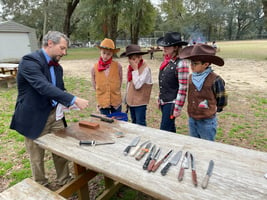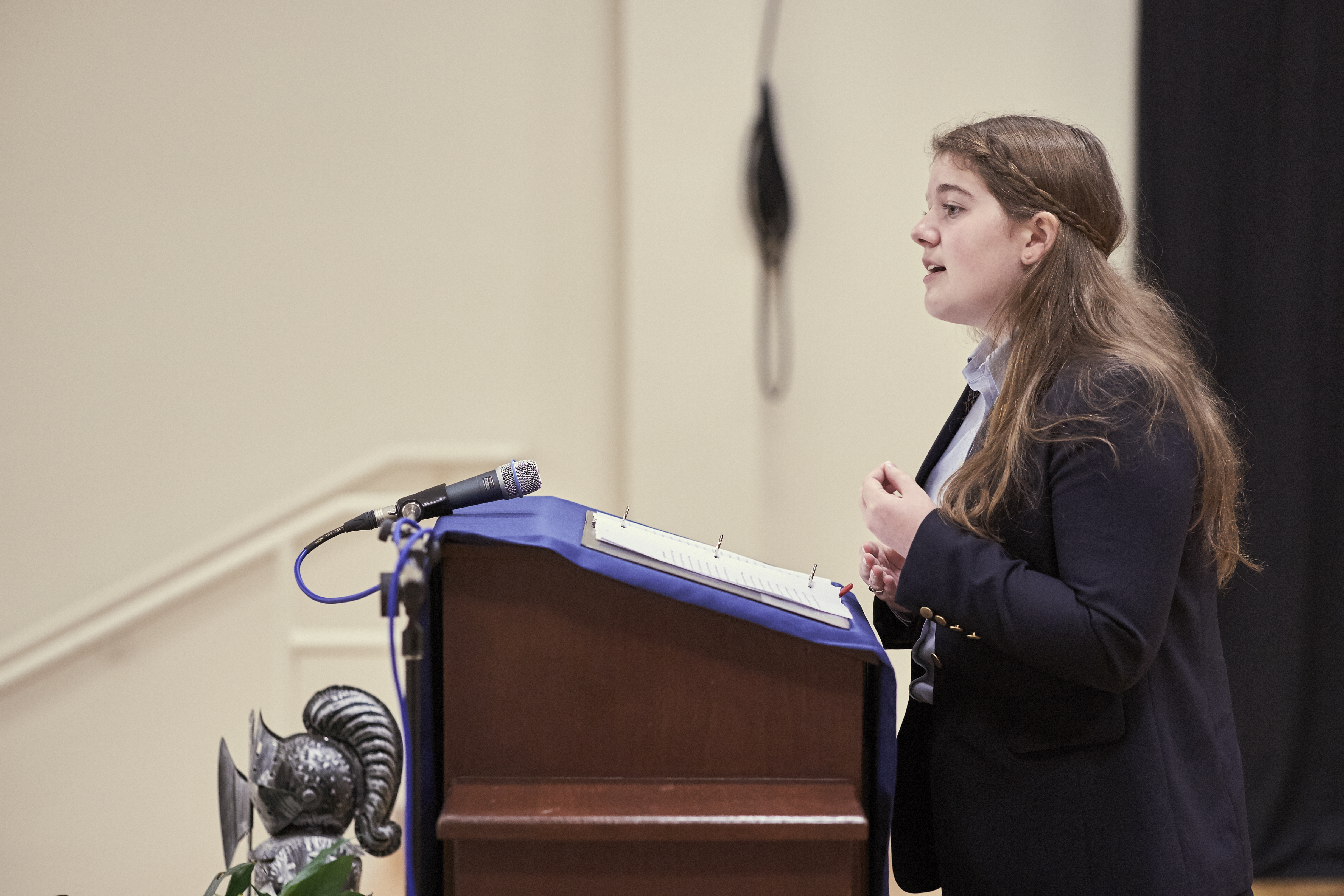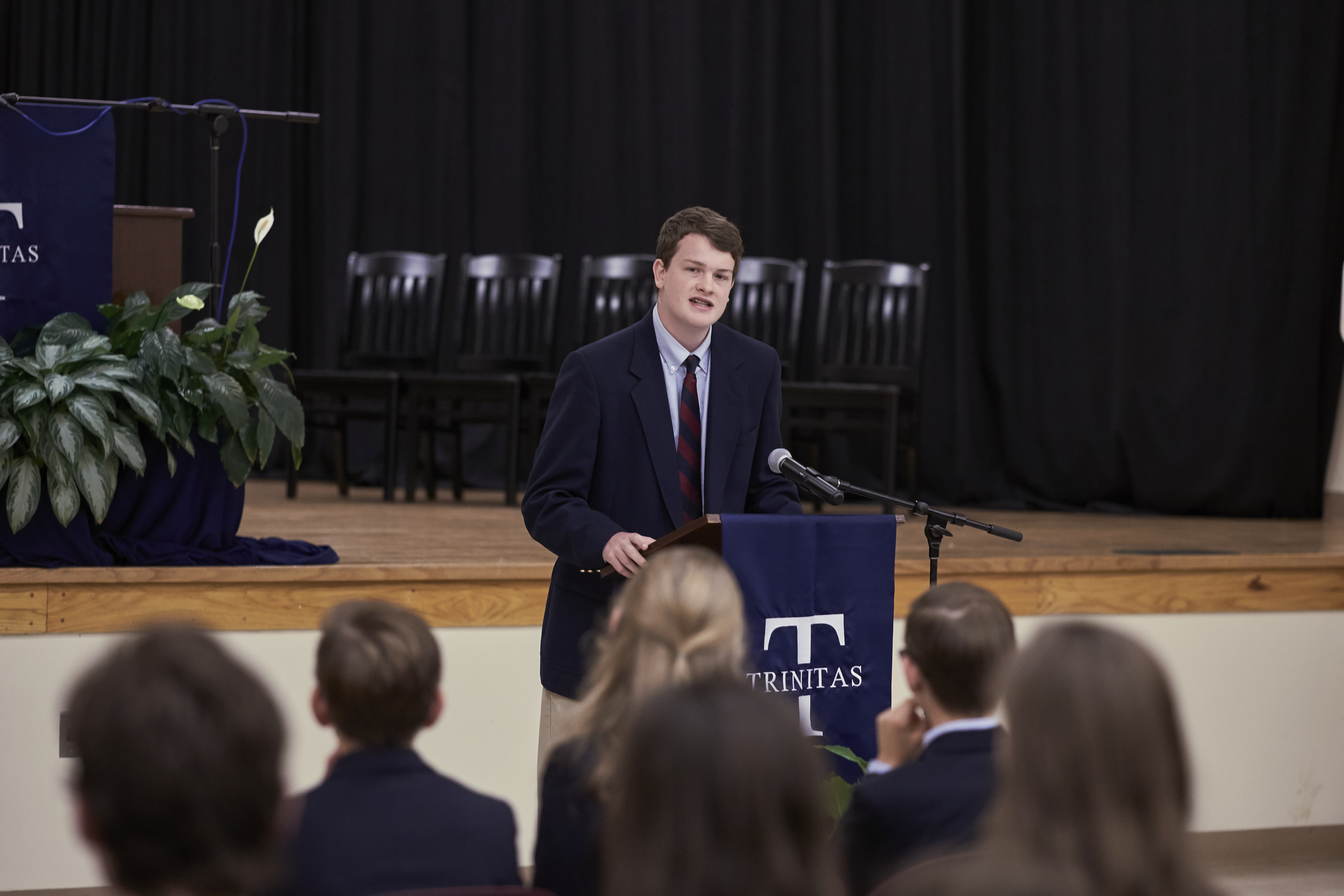On Father’s Day my pastor used the term “father famine” to describe the lack of fathers and fathering in our culture right now. Even though the truths bound up in this term are familiar to me as a watcher of culture, the term slapped me in the face—it was that shocking. Our culture is truly in the midst of a father famine. And it is not simply that we lack headship in families. No, the problem is much deeper: we don’t even understand what good headship is. We—all of us, the whole culture—have little vision for fathers or fathering.
The Trinitas seniors recently finished their senior thesis project. It was as if the weight of the world fell off them on that day. They have been living with their topics and all the research and writing and re-writing for a year now. It felt good for them to turn in those papers and defend them before a panel of board members and faculty. It felt good for them to look back on their work well done and know they had accomplished that massive and daunting project they set out to accomplish a year ago.
Topics: Blog Posts, Thesis Projects, College Admissions
 We Americans are pretty independent people. In fact, independence is often considered a hallmark of Americanness, a particular American virtue if you will. For the next few minutes, however, please allow me to celebrate the antithesis to personal independence, that is, the virtue of community. I have been inspired recently to extol the virtues of community by the many parents and students at Trinitas who work behind the scenes to support each other and the school.
We Americans are pretty independent people. In fact, independence is often considered a hallmark of Americanness, a particular American virtue if you will. For the next few minutes, however, please allow me to celebrate the antithesis to personal independence, that is, the virtue of community. I have been inspired recently to extol the virtues of community by the many parents and students at Trinitas who work behind the scenes to support each other and the school.
Topics: Blog Posts, School Life, Community Service, Parent Involvement
A couple of weeks back I wrote about the need for parents to help their children mature spiritually so that their faith is not something they cast off as soon as they leave the home. Of course, there are lots of scriptural principles for our teaching our children to love God in word and deed. Two of my favorites are from Exodus 20 and Deuteronomy 6. The first is a promise of generational blessing to those who love God and keep His commandments; the second is a command to parents to teach our children God’s words and ways every minute of every day. Perhaps the most often quoted of these kinds of passages is Proverbs 22:6, “Train up a child in the way he should go, And when he is old he will not depart from it.” It is abundantly clear to me that even though we are supported in our work by the church and (if we are so blessed) the Christian school, the responsibility for training our children in the faith still rests with us as parents.
Topics: Blog Posts, Parenting, True Education, Christian Living
Our junior and senior classes have just returned from five days in New York City. Some schools would call it a junior-senior trip; we call it an aesthetics trip. On a Trinitas aesthetics trip the main mission is to discover beauty that we can’t discover at home. We go in search of music, dance, art, architecture, and food. It isn’t that we don’t have those things in Pensacola; it’s just that we can find more of them in places like New York City and Washington DC.
Topics: Blog Posts, Aesthetics Trip
Recently I proposed that the classical school movement is seeking to preserve the heritage of western civilization, in part, by teaching and training good oratory skills. I also explained some of the ways Trinitas begins this teaching and training as early as kindergarten. If the beginning is, as I mentioned last week, as simple as teaching five-year-olds good eye contact and clear enunciation, then the end of that training is guiding eighteen-year-olds through the writing, presentation, and defense of a senior thesis. There are, of course, many, many varied components between those two stages but perhaps none as important and exciting as the John Chrysostom Oratory Competition.
Topics: Blog Posts, History, Classical Education, Public Speaking
From Ancient Greece to the founding of the United States, one mark of western civilization has been excellent oratory. From Pericles to Patrick Henry and John Chrysostom to Thomas Jefferson (with Demosthenes and Cicero thrown in for good measure), the roots of western civilization have been nourished for more than two-thousand years by those with the ability to articulate lofty ideals in a way that leads to both understanding and inspiration in the hearer. We could call them the Silver Tongues of the West. But the West isn’t what it used to be. Oratory now seems most often employed to convince us to spend money on some product or to vote for a particular candidate. Of course it has always been used in this way, but it seems that in times past, good oratory was more memorably used by men such as those mentioned above to convince others of good ideas, the kind of ideas that change the world for the better.
Topics: Blog Posts, History, Classical Education, Public Speaking
Re-enrollment season at Trinitas is in full swing and, in fact, the deadline to re-enroll current students for next year is just a few days away. With the thought in mind that parents re-evaluate their child(ren)’s education during this season, it might prove helpful to review some of those distinctions that make Trinitas a rather not-so-ordinary sort of school.
Topics: Blog Posts, Admissions


.jpg)




.jpg)

